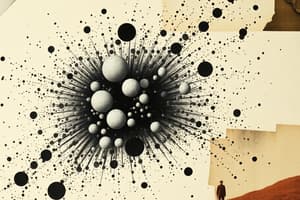Podcast
Questions and Answers
What is the definition of force in physics?
What is the definition of force in physics?
A pull or push that makes an object to accelerate.
What are the three components that completely define a force?
What are the three components that completely define a force?
Direction, point of application, and magnitude or strength.
What is the unit of measurement for force in the international system (S.I.)?
What is the unit of measurement for force in the international system (S.I.)?
Newton (N).
How does a body subjected to many forces, which cancel each other, behave?
How does a body subjected to many forces, which cancel each other, behave?
What are the two types of forces mentioned in the text?
What are the two types of forces mentioned in the text?
What is the net effect of all involved pushes and pulls on a body?
What is the net effect of all involved pushes and pulls on a body?
What is the concept of force used by people, and how does it differ from the one used in physics?
What is the concept of force used by people, and how does it differ from the one used in physics?
What is the precise definition of a force in physics?
What is the precise definition of a force in physics?
What happens to a body if it is subjected to many forces that cancel each other?
What happens to a body if it is subjected to many forces that cancel each other?
What are the three components that define a force in physics?
What are the three components that define a force in physics?
What is the focus of the present chapter?
What is the focus of the present chapter?
When does classical dynamics hold?
When does classical dynamics hold?
What happens if the speeds involved in the motion are not negligible compared to the speed of light?
What happens if the speeds involved in the motion are not negligible compared to the speed of light?
In what scale does classical mechanics fail in describing interacting particles?
In what scale does classical mechanics fail in describing interacting particles?
What led to the definition of acceleration?
What led to the definition of acceleration?
What concept is the present chapter focused on?
What concept is the present chapter focused on?
Flashcards are hidden until you start studying




